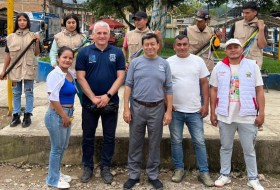News
Bicentennial Universities Lead Important Alliance to Investigate the Effects of Glyphosate on Health
As part of a project aimed at determining the effects of glyphosate on human health, a field visit was conducted in the municipality of Argelia, Cauca, to gather essential information for the research. The visit, which took place from June 18 to 28, 2024, included the participation of researchers from the University of Cartagena and the University of Cauca, the two Colombian public universities approaching their bicentennial, accompanied by the University of San Buenaventura.
Some time ago, we informed you about a conference given by researcher Jesús Olivero from the University of Cartagena, titled ‘Special Topics in Pesticides and Environmental Health.’ This conference was held within the framework of a project aimed at establishing the possible health effects on people exposed to aerial spraying of glyphosate in the municipalities of Argelia (Cauca), Santa Rosa del Sur (Bolívar), Bajo Baudó (Chocó), and San Vicente del Caguán (Caquetá). The main goal of this important work is to provide data that allows for informed decision-making and the adoption of necessary measures to protect the health of the affected communities.
In that context, as we continue with the implementation of the project, we bring the topic back to the table because we want to share the progress and current status of the project. From June 18 to 28, 2024, a visit was carried out to the municipality of Argelia, Cauca, where specific activities took place in the municipal center and the townships of El Mango, Sinaí, and El Plateado. As part of these activities, notable events included a meeting with municipal authorities to socialize the project, training sessions for surveyors, workshops in different educational institutions in the townships, public health talks, and meetings with the local population to inform them firsthand about this highly impactful process. Afterward, the Field Operation began, where surveys were conducted in the community, focus groups were formed, biological samples were collected and processed, and medical surveys were administered. It was a marathon of activities!

Provided photo
On behalf of the University of Cauca, the visit included the participation of environmental engineer and young researcher from the GCISA Group (Environmental Systems Engineering and Science Seedbed), Paola Rivera Chantre; the director of the research seedbed and dean of the Faculty of Civil Engineering, Juan Carlos Casas Zapata; environmental engineer and Master in Continental Hydrobiological Resources, Clara Delgado Rengifo; and biologist and master's student in Continental Hydrobiological Resources, Andrés Quiñones Parra, who is developing his thesis within this project.
"Arriving in the municipality of Argelia was a joy for me, and everything that was done was a very meaningful experience, especially with such strong allies like the University of Cartagena. Additionally, we received total acceptance as the University of Cauca, and being present through these types of projects allows us to understand the territory and continue joining efforts with various institutions and territorial entities," expressed the dean of the Faculty of Civil Engineering, Juan Carlos Casas Zapata, excited about having had the opportunity to experience this.
On the other hand, the University of Cartagena, as the executing entity, participates through the Doctorate in Environmental Toxicology with the Environmental and Computational Chemistry Research Group, classified in Category A1 by Minciencias. The group, led by Dr. Jesús Olivero Verbel, includes researchers Lucellys Sierra Márquez, Wilmer Peñates Hernández, and Juan Carlos Valdelamar Villegas. Additionally, researcher Claudia Consuegra Mayor from the University of San Buenaventura, Cartagena campus, is also involved.

Provided photo
It is important to mention that this experience was supported by the mayor of the municipality, Osman Duan Guaca Acosta, as well as the Secretary of Government, the Secretary of Health, the Secretary of the Environment, and the Secretary of Education. Support also came from members of the Community Action Boards, the Ombudsman's Office, the Fire Department, the National Police, the Church, among others, all of whom are interested in working for the community and the environment.
In this way, this academic institution from southwestern Colombia celebrates the execution of this project, as we know that the results will contribute to the well-being of people's health and the protection of the environment. This joint effort reflects our commitment to building peace through high-quality research and knowledge generation—knowledge that contributes to sustainable development and the improvement of the quality of life of those who live in our region.


